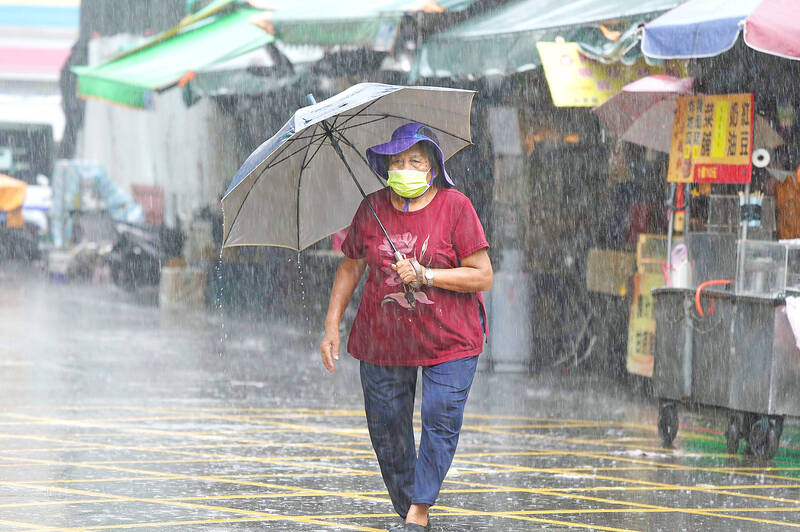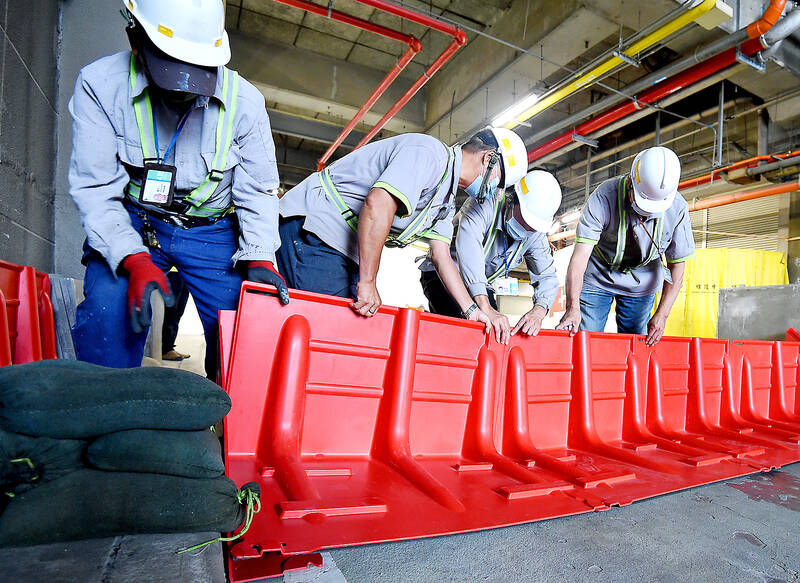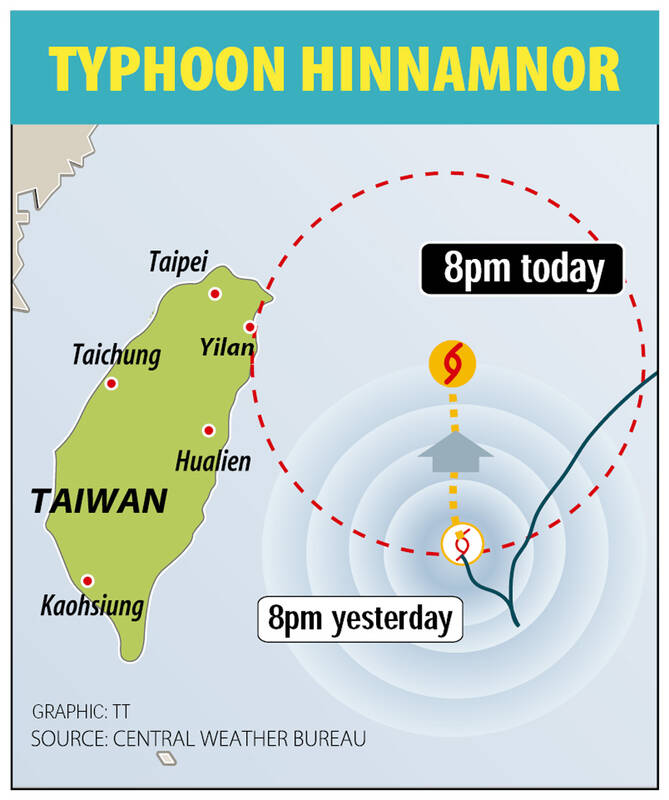A land warning is possible for Typhoon Hinnamnor as early as 2:30am today if the storm remains on its path and continues to expand, the Central Weather Bureau (CWB) said yesterday.
As of 5pm, the typhoon was centered 410km east of Oluanpi (鵝鑾鼻) on Taiwan’s southern tip and was moving north at 15kph, the bureau said.
Hinnamnor had maximum sustained winds of 162kph, with gusts of up to 198kph, it said.

Photo: CNA
CWB forecaster Lin Ping-yu (林秉煜) said the typhoon has weakened slightly, but its radius is likely to expand.
As of 5:50pm, accumulated rainfall totaled 207.5mm on Taipei’s Yangmingshan (陽明山), 177mm in Beitou District (北投) and 174mm on Yilan County’s Taipingshan (太平山).
Local authorities in northern Taiwan reported property damage from wind and rain in several places, but no injuries.

Photo: Chu Pei-hsiung, Taipei Times
School closures were announced for today for New Taipei City’s Pingsi (平溪), Rueifang (瑞芳), Shuangsi (雙溪) and Gongliao (貢寮) districts.
Other districts in New Taipei City, as well as Taipei, Keelung, Hsinchu County, Yilan County and Hualien County announced that criteria were not met for closures.
Taoyuan and Hsinchu City said no closures would be necessary.

In the capital, Taipei Rapid Transit Corp activated its typhoon prevention and response measures for the metropolitan railway system. Under the measures, when wind gusts reach level 10 (about 96kph) or the average wind speed within a 10-minute period reaches level 7 (about 56kph), services along elevated and outdoor lines would be temporarily suspended.
Underground sections would continue to operate, with times adjusted according to crowd conditions, the company said.
To prevent flooding, the MRT operator also put flood gates and water pumps on standby, and was increasing inspections in stations, underground shopping areas, parking lots and train depots, it said.
Flood-prevention facilities throughout the system can handle water levels of up to 110cm, which is based on flood data from the past few years, it said, adding that some stations are equipped with flood gates that activate when water passes through train tunnels near fault zones and river crossings.
However, there was good news for Taiwan’s reservoirs, which had been running low in the absence of any typhoons so far this year.
“Despite concerns, there is a benefit to typhoons for Taiwan, especially at times like now when there is a water shortage,” CWB Director-General Cheng Ming-dean (鄭明典) said.
Seasonal rainfall this summer was 40 percent the average amount measured in the past few years, the second-lowest on record, he said.
Minister of Transportation and Communications Wang Kwo-tsai (王國材) said the water level at Keelung’s Sinshan Reservoir (新山水庫) was at 38 percent capacity just a few days ago, and a yellow alert might have been called today, but rainfall brought by Hinnamnor improved the situation.
The typhoon is expected to bring 400mm to 700mm of rainfall, with most rain forecast in mountainous areas north of Miaoli County.
Meanwhile, the Yushan National Park Administration suspended admission to the park until after the typhoon passes.
Those who had been approved to enter would have to reapply after the closure is lifted, it said.
Such closures are standard procedure during typhoons, as strong winds and torrential rain might cause road closures, landslides and damage to trails that can be dangerous for hikers.
“Throughout the typhoon season — which is generally from June to September — we advise hikers and climbers to establish meeting points with their group, and to ensure they have functioning communications and positioning equipment,” it said.

MORE VISITORS: The Tourism Administration said that it is seeing positive prospects in its efforts to expand the tourism market in North America and Europe Taiwan has been ranked as the cheapest place in the world to travel to this year, based on a list recommended by NerdWallet. The San Francisco-based personal finance company said that Taiwan topped the list of 16 nations it chose for budget travelers because US tourists do not need visas and travelers can easily have a good meal for less than US$10. A bus ride in Taipei costs just under US$0.50, while subway rides start at US$0.60, the firm said, adding that public transportation in Taiwan is easy to navigate. The firm also called Taiwan a “food lover’s paradise,” citing inexpensive breakfast stalls

TRADE: A mandatory declaration of origin for manufactured goods bound for the US is to take effect on May 7 to block China from exploiting Taiwan’s trade channels All products manufactured in Taiwan and exported to the US must include a signed declaration of origin starting on May 7, the Bureau of Foreign Trade announced yesterday. US President Donald Trump on April 2 imposed a 32 percent tariff on imports from Taiwan, but one week later announced a 90-day pause on its implementation. However, a universal 10 percent tariff was immediately applied to most imports from around the world. On April 12, the Trump administration further exempted computers, smartphones and semiconductors from the new tariffs. In response, President William Lai’s (賴清德) administration has introduced a series of countermeasures to support affected

CROSS-STRAIT: The vast majority of Taiwanese support maintaining the ‘status quo,’ while concern is rising about Beijing’s influence operations More than eight out of 10 Taiwanese reject Beijing’s “one country, two systems” framework for cross-strait relations, according to a survey released by the Mainland Affairs Council (MAC) on Thursday. The MAC’s latest quarterly survey found that 84.4 percent of respondents opposed Beijing’s “one country, two systems” formula for handling cross-strait relations — a figure consistent with past polling. Over the past three years, opposition to the framework has remained high, ranging from a low of 83.6 percent in April 2023 to a peak of 89.6 percent in April last year. In the most recent poll, 82.5 percent also rejected China’s

PLUGGING HOLES: The amendments would bring the legislation in line with systems found in other countries such as Japan and the US, Legislator Chen Kuan-ting said Democratic Progressive Party (DPP) Legislator Chen Kuan-ting (陳冠廷) has proposed amending national security legislation amid a spate of espionage cases. Potential gaps in security vetting procedures for personnel with access to sensitive information prompted him to propose the amendments, which would introduce changes to Article 14 of the Classified National Security Information Protection Act (國家機密保護法), Chen said yesterday. The proposal, which aims to enhance interagency vetting procedures and reduce the risk of classified information leaks, would establish a comprehensive security clearance system in Taiwan, he said. The amendment would require character and loyalty checks for civil servants and intelligence personnel prior to